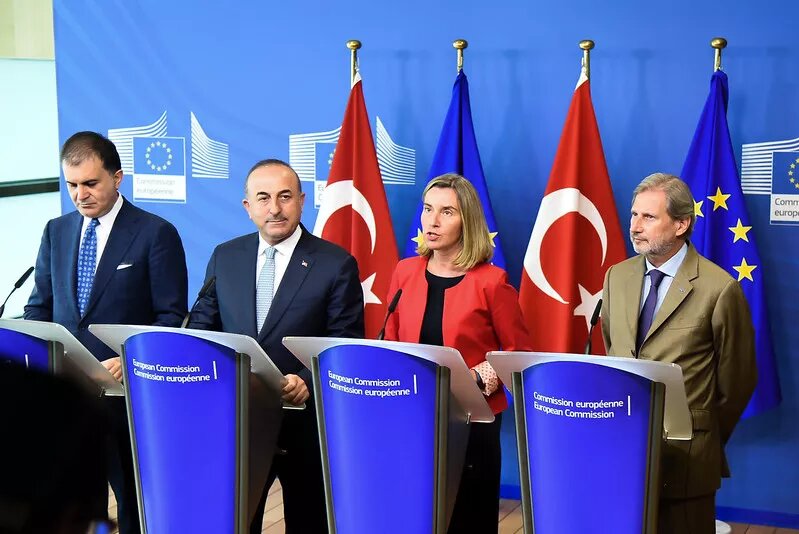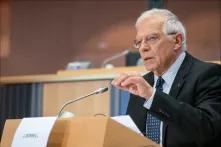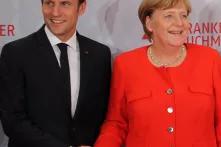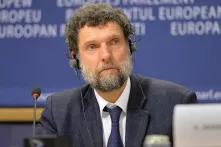Turkey’s entry into the European Union is no longer on the agenda, but the question of its relations with the EU remains on the table.

Neither in nor out: but then where? As long as it is no more possible for Turkey to become a member of the European Union than forever to remain on the EU’s doorstep, the answer to this question is that the European institutions must evolve deeply enough to solve an issue that arises not only with Turkey, but with several of its other neighbors as well.
To expand to its immediate periphery, the European Union needs to deepen at its core. But before turning to a solution, it may be asked why Turkey can be no more inside than outside.
Whether deplored or welcomed, Turkey’s accession to the Union today would be overwhelmingly rejected within all 27 Member states, because political Islam has developed a fear of Islam throughout Europe, and because Europeans think that the successive enlargements have paralyzed a decision-making process that had not been designed for so many countries, with so many possibilities for deadlocks and vetoes.
These two issues alone would have been enough to close the Union’s doors to Turkey. But by throwing tens of thousands of opponents into prison, rekindling the Kurdish question, stoking war beyond its borders, and returning the country to the reign of arbitrary power, Mr. Erdogan has turned Turkey into an unstable and destabilizing state that it would be perfectly unreasonable to grant a seat on the European Council.
Turkey’s entry into the Union is thus no longer on the agenda, but the question of its relations with the EU remains on the table—wide open—for four reasons.
The first reason is that, since François I and Suleiman the Magnificent, European politics and alliances have never been able to ignore the Ottoman Empire. The Western chancelleries and press of the 19th century described the Sublime Porte as “the sick man of Europe”—of Europe, not Asia. Turkey has sought to tie itself to Western Europe for some 200 years, and the fact is that it has done so in key areas. Its urban middle classes are just as European as those of Paris, Warsaw or Berlin. One-half of this country aspires to join the Union and Mr. Erdogan is not eternal.
In both its continuity and its vagaries, Turkey’s situation will bring it back to the Union’s doorstep. The EU will thus eventually have to ask itself whether (to paraphrase Lyndon Johnson) it is better to have Turkey “inside the tent pissing out, than outside the tent pissing in.” Turkey today has two national borders with the Union, and is open to Central Asia, the Balkans, the Caucasus and the Middle East. With some 80 million inhabitants, its army, and the dynamism of its SMEs and conglomerates, Turkey is a regional power that cannot be ignored.
It has just recalled this fact in Libya, Syria, and Nagorno-Karabakh, as well as in Greek and Cypriot territorial waters. The EU has been dumbfounded. Recep Erdogan’s political, economic, and diplomatic weakening had reassured the Union, but, in the long run, Turkey’s history, geography, modernity, and Europeanness will force us to make choices.
For us Europeans, is it better to have this power with us, playing its game but playing it within the framework of the Union; or to have it against us, trying to restore Ottoman influence in the name of Islam, of the Orient, or both, in contact with Russia or China, or both, but in any case, at our expense?
The answer lies in the question, and what will need to be considered one day is not “Turkey’s entry into the Union,” but the Union’s entry into Turkey, so that our alliance can project our European influence by projecting the influence of a European Turkey into what were once Ottoman and bordering lands.
If we want to stabilize our Mediterranean surroundings, the Maghreb and the Mashreq, then this is an imperative. But apart from the fact that nothing solid can be done before Mr. Erdogan’s departure, we will not be able to do anything serious ourselves until we have rethought the EU.
The European Union must assert itself on the international stage. It must develop the industrial, diplomatic, and military means to become one of the world’s three powers, having already become one of the top three economic powers of this century. Since Donald Trump and Covid 19, the EU has moved forward, by relinquishing its taboos on common defense, industrial policy, and joint borrowing. But for the time being at least, not all of its Member States share these ambitions. Many of them even believe that we have already gone too far towards political union, and this divergence is now so real, that those who want it must now deepen their ties in order to create a political Union within the European Union.
Many Member States are horrified or frightened by this expression: but “yes”, we need a multi-speed Union, two Unions in one, because this revolution is the sine qua non for European sovereignty and, more immediately, for overcoming the EU’s current blockages. We have to go through this, and when we have achieved it, further enlargement of the Union will become possible again.
We will then be able to open ourselves to Turkey, as well as to Serbia, to the Western Balkans, to those former Soviet republics that would wish so, to Great Britain one day, and perhaps also to some of the countries on the southern and eastern shores of the Mediterranean. In light of the Turkish issue, we need to learn how to equip the Union with a hard core that will allow it to stop keeping its doors closed.



